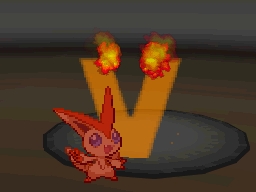GamesRadar+ Verdict
Pros
- +
Ridiculous amount of ridiculously deep content
- +
Way more post-game content
- +
Best multiplayer support yet
Cons
- -
Same eight gym formula
- -
No more Poketch
- -
Not having time for any other games
Why you can trust GamesRadar+
Pokemon Black and Pokemon White feel like what a DS Pokemon game should be. Of course, it has the ultra-deep battle mechanics that Pokemon is known for, coupled with the series' most beautiful graphics and sound to date. And with a new region and now over 600 Pokemon to collect and train, there's more content in B&W than in most (practically all) full console games. No doubt, Pokemon B&W is absolutely a fantastic game. If it were the first entry in the series, instead of a game built upon the shoulders of its predecessors, it would be the easiest 10/10 to award.
The big question though, is whether or not enough significant upgrades have been made since the last DS generation of Pokemon games to justify Black/White's existence. To find out, let's start at the beginning.
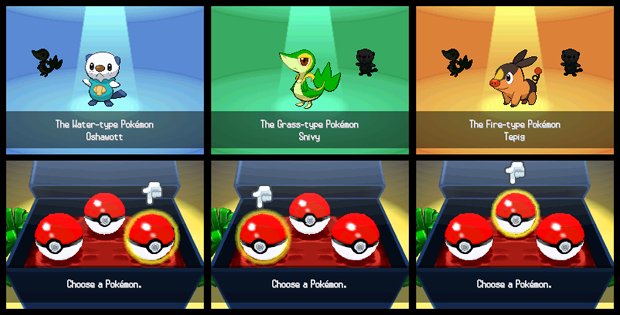
Obligatory explanation of the Pokemon series
Pokemon is like an RPG with over 600 playable characters to choose from. You play as a Pokemon trainer who adventures around a region filled with cities and wilderness, catching various Pokemon and then using your captured Pokemon to battle other Pokemon. Besides exploration, the core gameplay mechanic has two main components: collecting and battling.
The collection aspect ("gotta catch 'em all!") is what Pokemon is most well-known for, and rightly so. What elevates Pokemon's collecting mechanic into compulsive addiction territory, besides the imaginitive designs of the Pokemon themselves, is that every Pokemon is literally unique. You can rest assured that your Snorlax is in some way different than anyone else's Snorlax, from his IVs (individual values determined at birth that affect his stats – like Pokemon genetics), to his EVs (effort values that affect his stats based on how you trained him), to his nature (a value that effects his strengths and weaknesses), OT (original trainer) and so on.
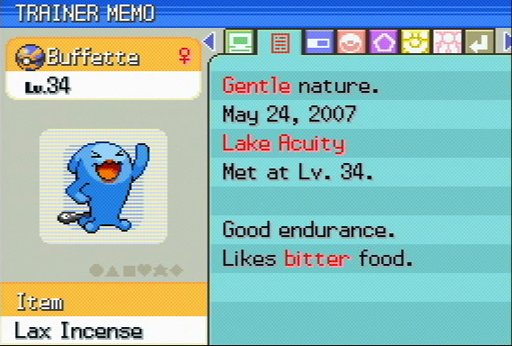
Above: This is my Wobbuffet, not yours
So much data goes into each Pokemon that it essentially constitutes a sort of DNA, and many complex values work in conjunction to create differences among Pokemon that range from subtle to extreme. Even if you're not familiar with the details of how everything works under the hood, you can still see the results as your Pokemon grow in various ways, and it's why properly training a Pokemon by battling it with other Pokemon can be so rewarding.
But you don't need to know any of this to enjoy Pokemon. The true brilliance of the series is that it can be played on a wide array of levels from shallow to the deepest of the deep. On the surface, it's a basic, turn-based RPG that's simple enough that even a fairly small child could grasp it and successfully play through the story campaign. Delve deeper into the game mechanics though, and you find an unparalleled level of strategic depth, with infinite possibilities for training and battling Pokemon. And you don't have to play it on one end or the other – Pokemon players fall everywhere on the spectrum because the game allows for however much depth you're willing to explore.
What's new in Black %26amp; White?
Where to start? Like in previous generations, B&W adds a lot of little new features and improvements that add up to give it an overall evolved feel. The most immediately noticeable improvement is in the graphics – this is a showcase for how absolutely beautiful sprite graphics can be. The pseudo-3D visuals perfectly show not only how timeless sprite art can be, but at the same time show how it can be updated to look modern and fresh. B&W truly looks worthy of the DS hardware while maintaining the beloved aesthetic of the series.
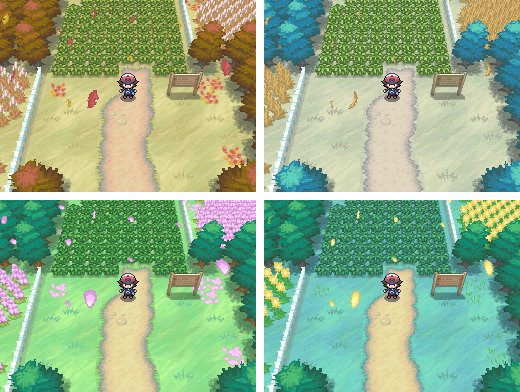
Gameplay-wise, in the single-player, our favorite addition is definitely the seasonal changes. Exploring a new region is one of our favorite aspects of playing a new Pokemon game, and the seasonal shifts add a dynamic element to exploration that we haven't seen in the series since the real-time day/night cycles introduced in Gold and Silver. Seasons also have a real-time component, but they cycle through by calendar month rather than by real-life season, so Spring is in real-life January, Summer is in February, Fall in March, Winter in April, then Spring again in May and so forth. The day/night cycle and days of the week still exist too, and days are even longer in Summer and shorter in Winter, which is a cool touch.
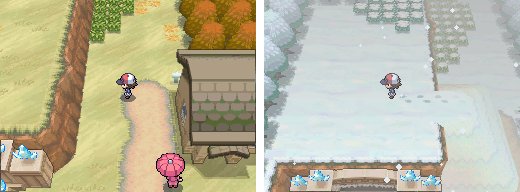
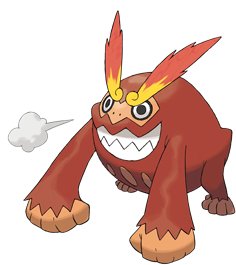
Seasons aren't just dynamic visually either – they actually affect the gameplay and your ability to explore the environment. Winter has the most pronounced changes, where ponds freeze over so you can't fish or surf, but piles of fluffy snow form below cliffs, so you can walk up the gently sloping snow to access a previously inaccessible area. And of course, some wild Pokemon encounters vary by season too, depending on the Pokemon's particular habits. All together, the seasons go far to make Unova feel like a living, breathing world that you can explore at length and continue to discover new things even when revisiting previously explored areas.
And of course, there are 150+ new Pokemon to discover, catch and train. Some of them are clearly inspired by Pokemon from previous games, like Woobat, who shares some common traits with Zubat from the original 151. Most, however, feel fresh and new, with creative visual designs and many with new type combos. Ultimately, it's going to come down to personal taste whether you like the new Pokemon, and as always some are obviously cooler than others, but overall it feels like an inspired bunch that's about on par with Pokemon introduced in generations past.
More info
| UK censor rating | "3+" |
| Franchise name | Pokemon |
| US censor rating | "Everyone" |
| Platform | "DS" |
| Alternative names | "Pokemon Black Version","Pokemon White Version" |
| UK franchise name | Pokemon |
| Description | It may not break the Pokemon mold, but Black/White offers enough new content coupled with the series' classic, deep battle mechanics to make it endlessly playable. If you could only play one game for the rest of your life, this would be a wise choice. |
| Release date | 1 January 1970 (US), 1 January 1970 (UK) |
